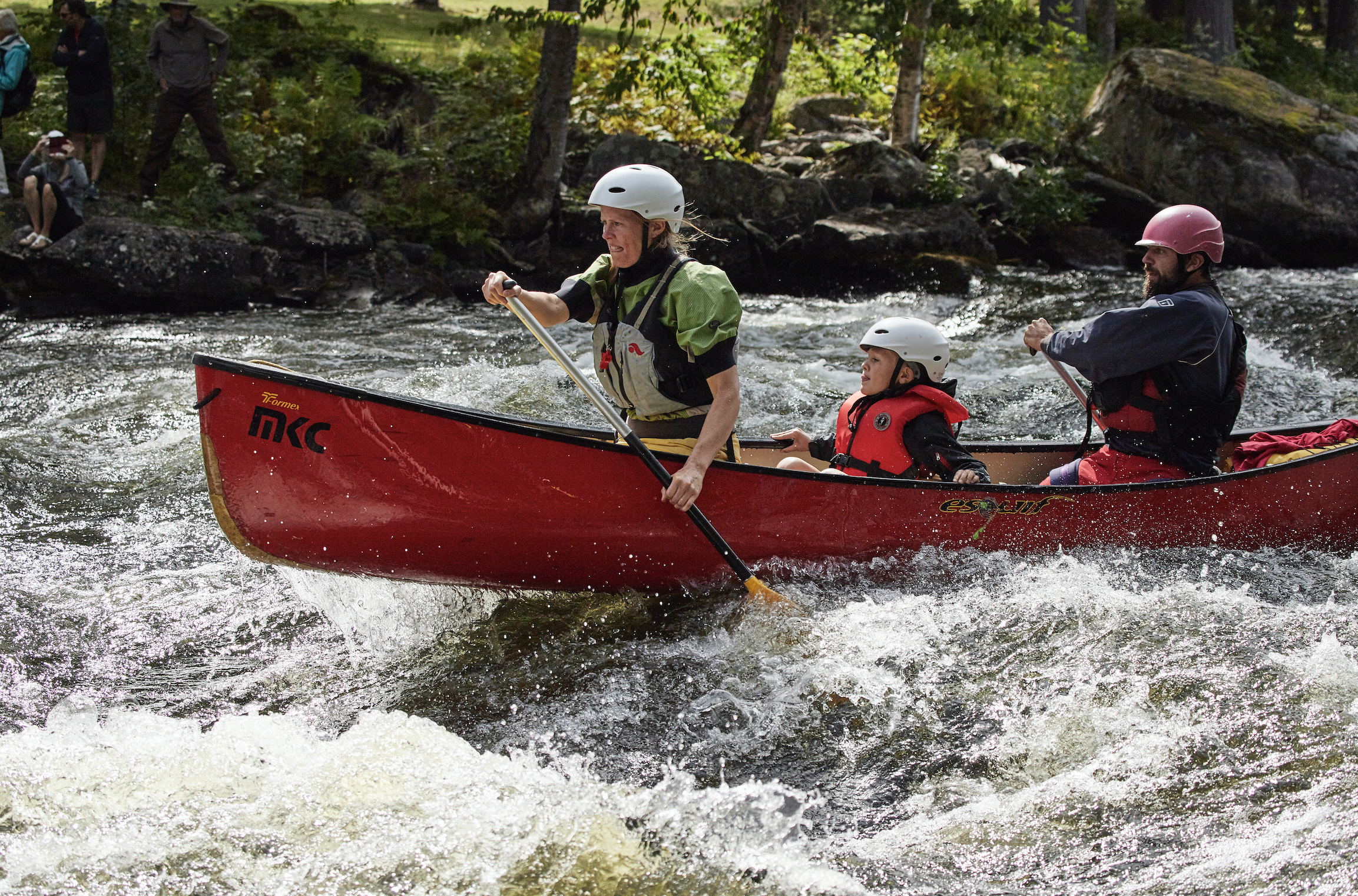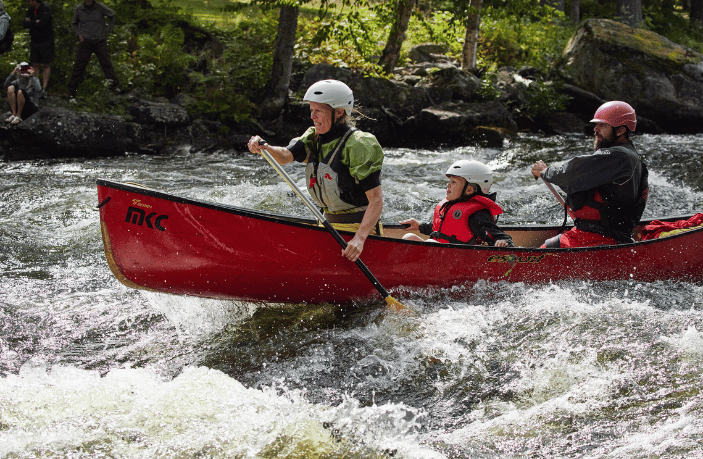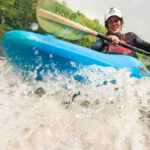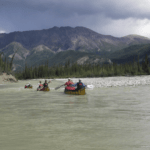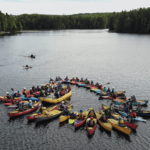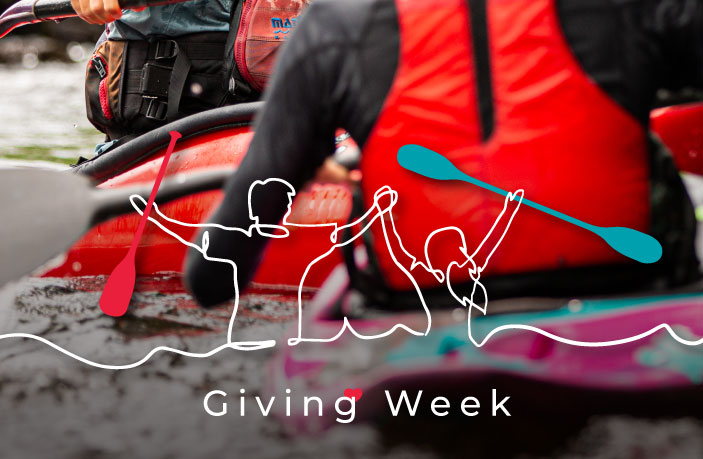Whitewater canoeing offers a unique blend of adrenaline-pumping excitement often complemented by breathtaking scenic views while the sounds of rushing whitewater envelop the journey. This makes it a cherished outdoor pursuit appealing to adventurers across all skill levels. Whether you’re a beginner looking to dip your paddle into whitewater or an experienced paddler seeking to sharpen your skills, this guide will help you begin your whitewater journey! These are the most common questions we get, and below are our answers:
1)What is whitewater canoeing?
2)What equipment do I need for whitewater canoeing?
3)How do I learn whitewater canoeing skills?
4)What safety precautions should I take while whitewater canoeing?
5)How do I choose the right river for whitewater canoeing?
6)What are some common whitewater canoeing techniques?
7)What should I do if I capsize a whitewater canoe?
8)How should I choose a whitewater canoe?
9)What are some popular whitewater canoeing destinations?
1. What is Whitewater Canoeing?
Whitewater canoeing is a sport that involves navigating a canoe through moving water, typically on rivers with varying degrees of turbulence and rapids. Unlike traditional canoeing on calm lakes or slow-moving rivers, whitewater canoeing presents additional challenges such as navigating obstacles, reading currents, and maneuvering through rapids. You can enjoy this activity in a solo canoe or tandem canoe – tandem canoes are generally better suited for canoe tripping for additional storage room. Solo canoes offer more of a challenge in either playing in rapids independently or for the more solo adventurer traveling the rivers of the world.
2. What Equipment Do I Need For Whitewater Canoeing?
Whitewater canoes can be made of many different materials. Traditionally, birch bark, then cedar canvas. Now, for low impact and lightweight canoe experiences, a composite material, and for more durable boats, there are a variety of polyethylene materials. At Madawaska Kanu Centre, our whitewater canoe fleet is made up of mostly T-formex and Royalex. These materials are a combination of ABS exterior, layered with a foam core for buoyancy and dexterity.
Essential equipment for whitewater canoeing includes a single-blade paddle for control and maneuverability, a properly fitted helmet to protect your head in case of capsizing or collisions, a personal flotation device (PFD – which is always required for any water sport of course) dry bags, throw ropes, first aid kits and appropriate footwear that provide traction and protection. If you’re on the water in the summer, don’t forget your handy sunscreen and eye protection. Sun damage is no joke! Additional gear may be recommended depending on whether you’re just out for the day, or on a multi-day trip.
3. How Do I Learn Whitewater Canoeing Skills?
While it’s possible to learn the basics of canoeing on your own, you may feel more confident and comfortable in seeking instruction from certified whitewater instructors. We recommend signing up for a multi-day whitewater canoeing course, especially for beginners. These courses are not only a rejuvenating active vacation but also cover essential skills such as river reading, paddling maneuvers, and rescue techniques. Practice sessions on gentle rapids gradually build confidence and competence before tackling more challenging whitewater.
If you’re interested in canoe tripping and have already taken a whitewater course at Madawaska Kanu Centre, we’d recommend checking out some of our favourite canoe trip guiding companies!
4. What Safety Precautions Should I Take?
Safety should always be a top priority when whitewater canoeing. Before hitting the rapids, familiarize yourself with the river’s flow, obstacles, and potential hazards by scouting the route or consulting experienced instructors and paddlers. Always wear your helmet and PFD, and never paddle alone—whitewater canoeing is best enjoyed with a group of experienced paddlers who can assist in emergencies. Additionally, learn and practice self-rescue techniques such as your roll, using your throw bag, and swift water swimming to increase your confidence and ability to handle unexpected situations.
Whether you’re an aspiring outdoor industry professional, or you’re just hoping to be a safety asset to your whitewater canoeing & kayaking crew, we’d recommend checking out some safety certification courses, such as wilderness first aid or river rescue.
5. How Do I Choose the Right River?
The appropriate river for your skill level is crucial for a safe and enjoyable whitewater canoeing experience. Start with rivers classified as Class I or II, which feature small waves and few obstacles – ideal for beginners. As your skills progress, gradually tackle more challenging rivers with higher classifications, BUT always assess the water conditions, weather forecast, and your abilities before embarking on any whitewater adventure. Along with traveling in a pack, we’d recommend letting a friend or family member know about the location and timeline of your adventure.
6. What Are Some Common Whitewater Canoeing Techniques?
Mastering various paddling techniques is essential for navigating rapids with precision and control. These techniques include:
- Forward Stroke: In whitewater, it’s important to use your core muscles to get strength to proper the canoe. Torso rotation is key for this effect.
- Stern Draw Stroke: Steers the canoe from the stern away from the paddler’s side. Useful for eddy turns and river running control.
- Stern Pry Stroke: Steers the canoe from the stern toward the paddler’s side. You’ll be doing lots of little prys, using the gunnels as a folcrom point for more effective steering control.
- Eddy-Out or Peel-Out: Using a carving turn in your canoe, and holding an edge toward the inside of the arc, you can launch the canoe from an eddy pool into the main current. And then, the same carving technique to get back into an eddy pool!
- Ferries: You can cross the river to reach the desired destination while minimizing downstream drift by facing your canoe upstream and opening up your angle toward your desired location.
A fun party trick, but not essential to enjoying the craft of whitewater canoeing, is a canoe roll. This skill rarely comes naturally, it takes lots of patience and practice. A roll refers to a technique used to right a capsized canoe without leaving the boat. The goal of the roll is to use body movement and paddle placement to leverage the water’s buoyancy and the boat’s design to flip the canoe upright. This skill can be important, as it allows paddlers to recover quickly from a capsized position and continue paddling without needing to swim to shore.
7. What Should I Do if I Capsize a Whitewater Canoe?
Capsizing can be common in whitewater canoeing, and it can be managed safely with proper preparation and practice. If you capsize, stay calm. It is very important to get your body to the surface of the water to avoid your feet and legs interacting with obstacles below the river surface. Get into the “starfish” position to float on your back in the potentially shallow moving currents. Your lifejacket will be crucial to help make this comfortable. Ideally, hold onto your paddle so not to lose it, and position yourself downstream of the boat to avoid being pinned against obstacles. Perform a swift water swim (keeping your body entirely on the surface) to reach the shore or a safe eddy. Self-rescue is the best kind of rescue, but it’s important to also have safety-minded paddling companions. If the circumstances allow it, and you’ve mastered your roll in moving waters, you could also attempt this maneuver to upright yourself without assistance.
8. What Whitewater Canoe Should I Use?
When choosing a whitewater canoe, consider your skill level, goals, and budget. Beginners may opt for a stable, maneuverable canoe with a flatter bottom for easier control. Intermediate paddlers might choose a more responsive canoe with a rounded bottom for improved maneuverability in rapids. Advanced paddlers may look for a high-performance canoe designed for specific types of whitewater. Additionally, consider your goals – whether you’re paddling for fun, competition, or expedition – and your budget, as canoes vary widely in price based on material, design, and features. Ultimately, test paddling different canoes and seeking advice from experienced paddlers can help you find the right canoe for your needs! We have a variety of whitewater canoes at the Madawaska Kanu Centre, we recommend renting a boat during your course so you can try a multitude of options before you buy (from your local canoe retailer of course!).
9. What Are Popular Whitewater Canoeing Destinations?
We’re so fortunate to say that Canada is home to some of the best whitewater canoeing destinations in the world – specifically the winding rivers of Ontario & Quebec. The Madawaska River, located in Ontario, offers a variety of rapids suitable for all skill levels. Other popular destinations include the Dumoine River, the Petawawa, the Ottawa River, and the Rouge River. There are so, so many more! Which is why we always like to keep exploring.
Final Notes
Equipping yourself with the right knowledge, skills, and safety precautions allows you to embark on unforgettable whitewater canoeing adventures while staying safe and enjoying journeying beautiful whitewater. So grab your paddle, wear your helmet, and get ready to paddle your way through the wild rapids—it’s time for you to make waves in the world of whitewater canoeing!
Check out more FAQs here!
For further information and questions about our whitewater canoeing courses, please don’t hesitate to contact us! We hope to hear from you soon.
